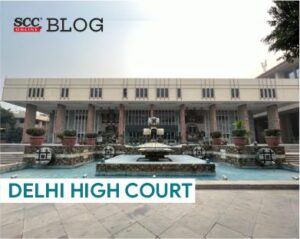Delhi High Court: By way of an appeal under Section 374 of Code of Criminal Procedure, 1973 (‘CrPC'), the appellant who was aggrieved by the judgment and order on sentence passed by the Additional Sessions Judge-01, Patiala House Court, New Delhi wherein he was convicted of offences punishable under Section 399 and 402 of the Penal Code, 1860 (‘IPC') and Section 25 of Arms Act, 1959 (‘Arms Act'), was granted relief by the Single Judge bench of Swarana Kanta Sharma, J., and acquitted the accused of all charges since the trial was vitiated due to non-assistance by legal aid counsel.
The Court expressed its doubts on the case of the prosecution who alleged that the accused person making preparation and hatching conspiracy to commit offence of dacoity was overheard by the Head Constable, whereas the place where the accused was allegedly preparing to commit the offence was not even identified.
Expressing how the case of the prosecution was even more doubtful, the Court stated that the testimony of witnesses examined in the Court were silent about discovery of evidence recovered from the appellant, whereas, the seizure memo noted the recovery of such evidence on record, resulting to the view of that Court that the Trial Court had erred to take note of the same while appreciating the evidences.
The Court in dismay stated that the Trial Court failed to provide effective legal aid to the accused. Total five witnesses were examined, who were police witnesses and who were not even cross-examined as the accused was not represented by his counsel.
In addition, while recording the evidence in the Trial Court, presence of counsel was not mentioned. Amicus Curie was appointed for the accused at State's expenses, however, except at the time of recording of statement under Section 313 CrPC and hearing arguments on sentence, the Amicus Curie was not present, even on the day when final arguments were heard.
The Court while navigating through the provisions of Article 21, 22 and 39-A of the Constitution of India, stated that certain Fundamental Rights (‘FR') are unfettered during the trial and imposes certain duties upon the State. It further stated that the offence in the present cases attracted punishment up to 10 years, yet the Trial was conducted in the most causal manner wherein the accused was not provided legal aid at any stage of the trial.
The Court took note of catena of judgments of Supreme Court on laws that laid down the procedure of fair trial. It stated that the very object of providing effective legal aid to a person undefended or unrepresented is to ensure that he gets just trial in a criminal case which was also crystalised in the case of Zahira Habibullah Sheikh v. State of Gujarat (2006) 3 SCC 374.
The Court took note of the fact that the Order sheers were written in the most indifferent manner by the Trial Court and at most places the name of the Counsel was not even mentioned.
“The Courts are the guardians of a person's liberty and are duty bound by Constitution as well as their oath to ensure fair trial to an accused which is the constitutional goal set by the Indian Constitution itself.” observed the Court.
The Court while expressing in dismay stated that vast sums of money are disbursed to establish legal aid centres, and State Legal Services Authorities to help those who fail to hire the best lawyers due to their poverty. Lawyers in criminal Courts are absolute necessity and not luxury.
The Court stated that the noble goal prescribed under the FRs would fail, in case if poor man charged with an offence is unable to defend himself without a lawyer to assist him keeping in mind the fact that more serious of an offence would have greater consequences.
The Court held that the absence of cross-examination of witnesses resulted in gross miscarriage of justice. The omission of fair and proper trial is not only a violation of fundamental principles of judicial procedure and constitutional mandate but is also a violation of mandatory provisions of Section 304 CrPC.
“The accused has faced trial for last 15 long years. At times, though the agony of a person undergoing trial is not mentioned on the paper while a Judge writes a judgment, the trial which has been prolonged beyond 15 years is an agony itself. The stress of facing a criminal trial is punishment unannounced in a case, as the present one.” observed the Court.
Therefore, the Court without remanding back the matter to Trial Court to again conduct a fresh trial, acquitted the accused of all the charges since the trial was vitiated due to non-assistance of accused by legal aid counsel, besides existence of several inconsistencies and lacunae in the prosecution's case.
[Sunil v. State, 2023 SCC OnLine Del 104, decided on 05-01-2023]
Advocates who appeared in this case :
Gayatri Nandwani with Mudita Sharda, Advocates ,for the Petitioner;
Naresh Kumar Chahar, Advocate, for the Respondent.

